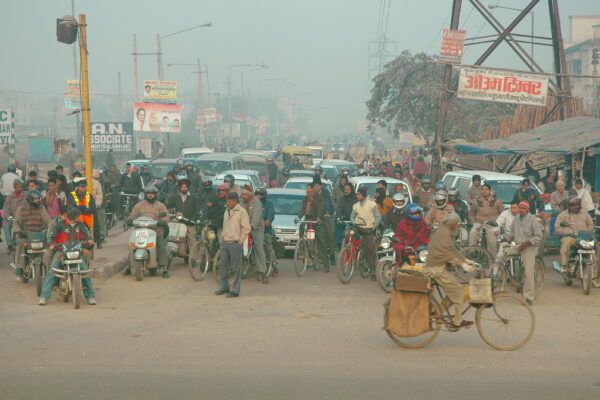Air pollution is bad for business
Air pollution hampers workforce productivity and economic activity: 1.2 billion work days are lost globally every year, which could reach 3.8 billion days by 2060. The World Bank estimates that the health damage caused by air pollution costs $6 trillion a year. That’s a 5% reduction of global GDP, due to health impacts, lost productivity and reduced life expectancy.
Air pollution is closely linked to climate change and harms vital ecosystems, causing global crop yield losses of 3-16%, according to UNECE. Poor air quality also impacts talent recruitment: cities with severe air pollution are viewed as less desirable places to work. Some companies have even offered hardship-posting compensation for employees relocating to cities with dangerous air pollution levels.
Building stronger economies
Improving air quality is key to building stronger economies. A report by the Confederation of British Industry (CBI) showed that the UK could prevent 17,000 premature deaths each year and benefit by £1.6 billion annually if it met the World Health Organization guidelines for air pollution. This is in addition to the health and social care savings to the National Health Service (NHS).
With air pollution hitting the balance sheets of businesses across the country, and cutting the earnings of their employees, cleaning up our air would help us to lead healthier and more productive lives, while delivering a green jobs boost for the economy.
Rain Newton-Smith, CEO, CBI
In India, reduced productivity, work absences and premature deaths caused by air pollution cost the economy an estimated $95 billion – or 3% of the country’s GDP – in 2019. Despite the EU’s recent progress, air pollution still causes €600 billion in losses each year, or 4% of its annual GDP. The evidence is clear: tackling dirty air and prioritising public health is good for our economies.
Clean air action is profitable. Promoting clean air is not only compatible with, but can boost, economic growth. Air pollution reduction has boosted the EU economy by €50 billion to €60 billion each year since 2014.
Miquel Oliu-Barton, Bruegel
Clean air for the SDGs and ESG
Every company – regardless of sector or size – contributes to the problem through their supply chains, office buildings, transport, employees, data systems, manufacturing and more. Commercial activities, such as energy production, agriculture and transport, contribute to around 40% of particulate matter (PM2.5) emissions.
While commercial activities are scrutinised for their greenhouse gas footprint, their emissions of toxic air pollutants go unchecked. By taking joined up action on climate and air quality, businesses can boost their environmental, social and governance (ESG) impact and performance.
Beyond corporate social responsibility, the interconnected nature of clean air measures would help achieve the UN’s Sustainable Development Goals (SDGs) and boost sustainable growth in developed and developing economies. Clean air is especially important for the SDGs on health, sustainable cities, environmental sustainability, industrialisation, reducing inequality and mitigating the effects of climate change.
Our work with businesses
In partnership with the World Economic Forum, we launched the first global corporate Alliance for Clean Air at COP26 in 2021. The founding corporate members of the alliance, which come from industries as diverse as transport, technology and retail, have committed to:
- measuring and reducing their air pollution footprint
- using their assets innovatively to accelerate clean air solutions
- championing clean air with customers and other stakeholders.
Some members have already published inventories of their air pollution emissions (linked below), a major step forward for private sector transparency. Explore them here:
Who are the alliance members?
- Accenture – view air pollution inventory
- Biogen – view air pollution inventory
- Bloomberg – view air pollution inventory
- Emirates NBD
- EY
- GEA – view air pollution inventory
- GoTo – view air pollution inventory
- GSK
- Haleon – view air pollution inventory
- Hydro
- IKEA – view air pollution inventory
- Maersk – view air pollution inventory
- Mahindra Rise
- Mitsubishi Electric
- Moderna
- Oracle
- ReNew Power
- Siemens
- Wipro – view air pollution inventory
Investors are primely positioned to drive corporate action on critical sustainability issues. Our grantee, ShareAction recently published a briefing, Clearing the Air, which sets out the first-ever investor case on tackling air pollution.
We are also working at the national level to encourage businesses to drive more ambitious action on air pollution. This includes a network of over 100 major Indian businesses coordinated through the Confederation of Indian Industry.
Even though there are many signs and evidence that society is off track with regards to global warming, it is more important than ever to act with urgency and stay committed to the Paris Agreement and to limit any overshoot as much as possible. To further support change, the IKEA business advocates for a complete phase out of fossil fuels and its subsidies, halting deforestation and addressing the root causes of air pollution.”
Pär Stenmark, Chief Sustainability Officer, Inter IKEA Group

